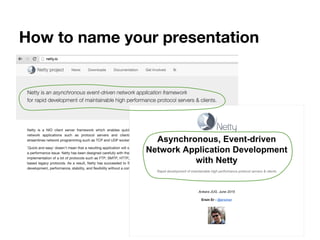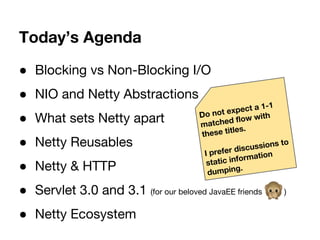Asynchronous, Event-driven Network Application Development with Netty
- 1. Asynchronous, Event-driven Network Application Development with Netty Rapid development of maintainable high performance protocol servers & clients Ankara JUG, June 2015 Ersin Er - @ersiner
- 2. About the speaker, Ersin Er Summary of what’s on LinkedIn ● Computer Sci. Student @ Hacettepe Univ. - BSc (’03), MSc (’06), PhD (~) ● Teaching Assistant [and System Admin.] @ Hacettepe Univ. (’03-’11) ● Committer and PMC Member @ Apache Software Foundation (’05-’10) ● Software Architect @ Peak Games (’11-’13) ● Co-founder and Solutions Architect @ Metasolid (’14-’15) ● Hands-on Solutions and Software Architect. ● Distributed Systems, Concurrency and Performance Programming enthusiast. ● Does tech biz, manages projects, deals with people. ● Used to be a perfectionist. Does not produce garbage.
- 3. How to name your presentation
- 4. Today’s Agenda ● Blocking vs Non-Blocking I/O ● NIO and Netty Abstractions ● What sets Netty apart ● Netty Reusables ● Netty & HTTP ● Servlet 3.0 and 3.1 (for our beloved JavaEE friends ) ● Netty Ecosystem Do not expect a 1-1 matched flow with these titles. I prefer discussions to static information dumping.
- 5. Let’s review Blocking Socket I/O in Java by examples in order to steer our discussions on Non-Blocking I/O, Java NIO and Netty.
- 6. Blocking I/O Socket Server Example Single Client, Single Request public static void serve1() throws IOException { ServerSocket serverSocket = new ServerSocket(10000); Socket clientSocket = serverSocket.accept(); InputStreamReader isr = new InputStreamReader(clientSocket.getInputStream()); BufferedReader in = new BufferedReader(isr); PrintWriter out = new PrintWriter(clientSocket.getOutputStream(), true); String request, response; if ((request = in.readLine()) != null) { response = request + " processed at " + new Date(); out.println(response); } in.close(); out.close(); } Protocol Implementation
- 7. Blocking I/O Socket Server Example Single Client, Multi Request public static void serve2() throws IOException { ServerSocket serverSocket = new ServerSocket(10000); Socket clientSocket = serverSocket.accept(); InputStreamReader isr = new InputStreamReader(clientSocket.getInputStream()); BufferedReader in = new BufferedReader(isr); PrintWriter out = new PrintWriter(clientSocket.getOutputStream(), true); String request, response; while ((request = in.readLine()) != null) { response = request + " processed at " + new Date(); out.println(response); } in.close(); out.close(); } Wow! That was easy!
- 8. Blocking I/O Socket Server Example Single Client, Multi Request, Client Exit Control public static void serve3() throws IOException { ServerSocket serverSocket = new ServerSocket(10000); Socket clientSocket = serverSocket.accept(); InputStreamReader isr = new InputStreamReader(clientSocket.getInputStream()); BufferedReader in = new BufferedReader(isr); PrintWriter out = new PrintWriter(clientSocket.getOutputStream(), true); String request, response; while ((request = in.readLine()) != null) { if ("Exit".equals(request)) { break; } response = request + " processed at " + new Date(); out.println(response); } in.close(); out.close(); } More Protocol
- 9. Blocking I/O Socket Server Example Multi Client, Multi Request, Client Exit Control public static void serve4() throws IOException { ServerSocket serverSocket = new ServerSocket(10000); while (true) { Socket clientSocket = serverSocket.accept(); InputStreamReader isr = new InputStreamReader(clientSocket.getInputStream()); BufferedReader in = new BufferedReader(isr); PrintWriter out = new PrintWriter(clientSocket.getOutputStream(), true); String request, response; while ((request = in.readLine()) != null) { if ("Exit".equals(request)) { break; } response = request + " processed at " + new Date(); out.println(response); } in.close(); out.close(); } } A new generation ofInternet servicesupporting multipleusers?..
- 10. Blocking I/O Socket Server Example Concurrent Clients, Multi Request, Client Exit Control public static void serve5() throws IOException { ServerSocket serverSocket = new ServerSocket(10000); while (true) { final Socket clientSocket = serverSocket.accept(); new Thread() { public void run() { try { InputStreamReader isr = new InputStreamReader(clientSocket.getInputStream()); BufferedReader in = new BufferedReader(isr); PrintWriter out = new PrintWriter(clientSocket.getOutputStream(), true); String request, response; while ((request = in.readLine()) != null) { if ("Exit".equals(request)) { break; } response = request + " processed at " + new Date(); out.println(response); } in.close(); out.close(); } catch (IOException e) { e.printStackTrace(); } } }.start(); } } !!! These are far from being production code. In fact, they are terrible ones. Uncontrolled Power!
- 11. Multi-Threaded Blocking I/O Exhausting Resources What to do? public static void serve5() throws IOException { ServerSocket serverSocket = new ServerSocket(10000); while (true) { final Socket clientSocket = serverSocket.accept(); new Thread() { public void run() { try { InputStreamReader isr = new InputStreamReader(clientSocket.getInputStream()); BufferedReader in = new BufferedReader(isr); PrintWriter out = new PrintWriter(clientSocket.getOutputStream(), true); String request, response; while ((request = in.readLine()) != null) { if ("Exit".equals(request)) { break; } response = request + " processed at " + new Date(); out.println(response); } in.close(); out.close(); } catch (IOException e) { e.printStackTrace(); } } }.start(); } } !!! These are far from being production code. In fact, they are terrible ones. Uncontrolled Power! What to do? ● Pooling? ● Executors? ● Queuing?
- 12. Multi-Threaded Blocking I/O Exhausting Resources What to do? - Critical Discussion public static void serve5() throws IOException { ServerSocket serverSocket = new ServerSocket(10000); while (true) { final Socket clientSocket = serverSocket.accept(); new Thread() { public void run() { try { InputStreamReader isr = new InputStreamReader(clientSocket.getInputStream()); BufferedReader in = new BufferedReader(isr); PrintWriter out = new PrintWriter(clientSocket.getOutputStream(), true); String request, response; while ((request = in.readLine()) != null) { if ("Exit".equals(request)) { break; } response = request + " processed at " + new Date(); out.println(response); } in.close(); out.close(); } catch (IOException e) { e.printStackTrace(); } } }.start(); } } !!! These are far from being production code. In fact, they are terrible ones. Uncontrolled Power! What to do? ● Pooling? ● Executors? ● Queuing? The discussion here iscritical for switching(our minds) to Non-Blocking I/O, Java NIOand Netty
- 14. Non-Blocking I/O ● Sockets in Non-Blocking Mode ● I/O Multiplexing ○ epoll (Linux) ○ kqueue (FreeBSD) ○ IOCP (Windows, Solaris) ● Single Thread for many sockets (or file descriptors) ● Key to high performance servers
- 15. Non-Blocking or Asynchronous? (Blocking or Synchronous?) Simplified definitions that can work for us today: ● Non-Blocking: No waiting for the operation to complete ● Asynchronous: Notification upon completion of non-blocking operation
- 16. Java NIO ● NIO = Non-Blocking I/O? ● It’s Java New I/O ● It’s no longer new (came with Java 1.4) ○ Java 7 comes with V2 ● Not only for Socket I/O ● First Class Citizens ○ Channels ○ Buffers ○ Selectors
- 17. NIO - Channels and Buffers ● Channels ○ FileChannel ○ DatagramChannel ○ SocketChannel ○ ServerSocketChannel ● Buffers ○ ByteBuffer ○ CharBuffer ○ DoubleBuffer ○ FloatBuffer ○ IntBuffer ○ LongBuffer ○ ShortBuffer ● Data are read from Channels into Buffers ● Data are written from Buffers into Channels
- 18. NIO - Buffers are serious business Buffer capacity, position and limit in write and read mode. Buffer.flip() makes the mode change. We also have: ● Heap Buffers ○ Array Based ○ ByteBuffer.allocate() ● Direct Buffers ○ Off-Heap ○ ByteBuffer.allocateDirect()
- 19. NIO - Selectors & I/O Multiplexing
- 20. OIO vs NIO
- 21. From NIO to Netty Using NIO directly is like using Naked Threads. Netty replaces NIO APIs with superiors and provides incredible capabilities.
- 22. Netty Core Components and Utilities ● Channels and Transports ● ByteBuf and Un/Pooled Allocation Management ● ChannelHandlers and ChannelPipeline ● The Codec Framework and Reusable Codecs ● Bootstraps and ChannelInitializers ● Futures and EventLoops
- 23. Channels and Transports Package View ● io.netty.channel.embedded ● io.netty.channel.epoll ● io.netty.channel.local ● io.netty.channel.nio ● io.netty.channel.oio ● io.netty.channel.rxtx ● io.netty.channel.sctp ● io.netty.channel.sctp.nio ● io.netty.channel.sctp.oio ● io.netty.channel.socket ● io.netty.channel.socket.nio ● io.netty.channel.socket.oio ● io.netty.channel.udt ● io.netty.channel.udt.nio ● io.netty.channel.unix ● You can both read from write into Channels (they are duplex as opposed to streams) ● All I/O operations on channels are asynchronous and return listenable futures ● Channels are implemented for various Transports types: ○ Unified API for NIO and OID (and others) ○ Epoll transport for extreme performance ○ Local transport for in VM communication ○ Embedded transport for Unit Testing
- 24. ByteBuf and Un/Pooled Allocation Management ● ByteBuf is improved version of ByteBuffer ● ByteBuf has both write and read index, does not need flip() ● CompositeByteBuf enables Zero-Copy ● ByteBufs can be pooled for reducing garbage collector pressure https://blog.twitter.com/2013/netty-4-at-twitter-reduced-gc-overhead
- 25. ChannelHandlers and ChannelPipeline Channel Inbound Handler Channel Inbound Handler Channel Outbound Handler Channel Outbound Handler Head Tail Socket Channel Pipeline ChannelPipeline has been designed with Intercepting Filter pattern and resembles Servlet Filters
- 26. Codec Framework ● Simplified and focused API on top of ChannelHandlers ● Decoders are ChannelInboundHandlers ● Encoders are ChannelOutboundHandlers ● Codecs are both CIH and COH
- 27. Reusable Codecs ● io.netty.handler.codec.base64 ● io.netty.handler.codec.bytes ● io.netty.handler.codec.compression ● io.netty.handler.codec.haproxy ● io.netty.handler.codec.http ● io.netty.handler.codec.http.cookie ● io.netty.handler.codec.http.cors ● io.netty.handler.codec.http.multipart ● io.netty.handler.codec.http.websocketx ● io.netty.handler.codec.marshalling ● io.netty.handler.codec.protobuf ● io.netty.handler.codec.rtsp ● io.netty.handler.codec.sctp ● io.netty.handler.codec.serialization ● io.netty.handler.codec.socks ● io.netty.handler.codec.spdy ● io.netty.handler.codec.string ● io.netty.handler.logging ● io.netty.handler.ssl ● io.netty.handler.stream ● io.netty.handler.timeout ● io.netty.handler.traffic ● DelimiterBasedFrameDecoder ● LengthFieldBasedFrameDecoder ● FixedLengthFrameDecoder ● LineBasedFrameDecoder Some primitive ones All of these represent patterns of protocol development
- 28. Bootstraps and ChannelInitializers Bootstraps help bootstrap channels (server or client side) ● Set EventLoopGroups ● Set ChannelHandlers ● Bind to Network Interfaces ChannelInitializer is a special ChannelHandler ● Handles channelRegistered event and applies its pipeline config to the channel ● (Suggested: See its source code)
- 29. Futures and EventLoops ● All I/O operations on Channels return listenable futures ● Each Channel is assigned to a single EventLoop and stays so during its lifetime ● EventLoops handle all I/O operations of their Channels ● EventLoopGroups are like Thread Pools and number of EventLoops they manage depends on number of CPU cores (and possible other factors) ● Listeners registered to Futures are handled by appropriate EventLoop selected by Netty
- 30. Now, Examples
- 31. Servlet ● Servlet 3.0 - Async Processing of Response ● Servlet 3.1 - Non-Blocking Processing of Request (Content) Did you expect more? Come on, this is Netty :-)
- 32. Netty Versions ● 3.x Old, Stable ● 4.0.x Current, Stable ○ Huge improvements over 3.x ○ https://github.com/netty/netty/wiki/New-and-noteworthy-in-4.0 ● 4.1 Beta (Close to be Stable) ○ Mostly backward compatible with 4.0 ○ Android support and lots of new codecs ○ https://github.com/netty/netty/wiki/New-and-noteworthy-in-4.1 ● 5.0 Alpha - Backward Incompatible Improvements ○ https://github.com/netty/netty/wiki/New-and-noteworthy-in-5.0
- 33. Ecosystem - Related Projects (The ones I’ve been interested in and mostly using Netty at its heart) ● Vert.x - A toolkit for building reactive applications on the JVM ● Ratpack - Simple, lean & powerful HTTP apps ● async-http-client - Asynchronous Http and WebSocket Client library for Java ● RxNetty - Reactive Extension (Rx) Adaptor for Netty ● nettosphere - A Java WebSocket/HTTP server based on the Atmosphere and Netty Framework ● grpc-java - The Java gRPC implementation (by Google) ● Play Framework - The High Velocity Web Framework For Java and Scala ● More at http://netty.io/wiki/related-projects.html and http://netty. io/wiki/adopters.html
- 34. Ecosystem - Resources ● Netty Documentation & Examples ○ http://netty.io/wiki/index.html ● StackOverflow ○ http://stackoverflow.com/questions/tagged/netty ● Netty in Action ○ http://www.manning.com/maurer/
- 35. Thanks ● You, attenders! ● Ankara JUG organizers, for having me here ● Jakob Jenkov, for allowing me use his diagrams for explaining NIO Concepts (http://tutorials.jenkov. com/java-nio/index.html)


![About the speaker, Ersin Er
Summary of what’s on LinkedIn
● Computer Sci. Student @ Hacettepe Univ. - BSc (’03), MSc (’06), PhD (~)
● Teaching Assistant [and System Admin.] @ Hacettepe Univ. (’03-’11)
● Committer and PMC Member @ Apache Software Foundation (’05-’10)
● Software Architect @ Peak Games (’11-’13)
● Co-founder and Solutions Architect @ Metasolid (’14-’15)
● Hands-on Solutions and Software Architect.
● Distributed Systems, Concurrency and Performance Programming
enthusiast.
● Does tech biz, manages projects, deals with people.
● Used to be a perfectionist. Does not produce garbage.](https://image.slidesharecdn.com/ersinernettyankarajugjune2015-150626011910-lva1-app6891/85/Asynchronous-Event-driven-Network-Application-Development-with-Netty-2-320.jpg)
































